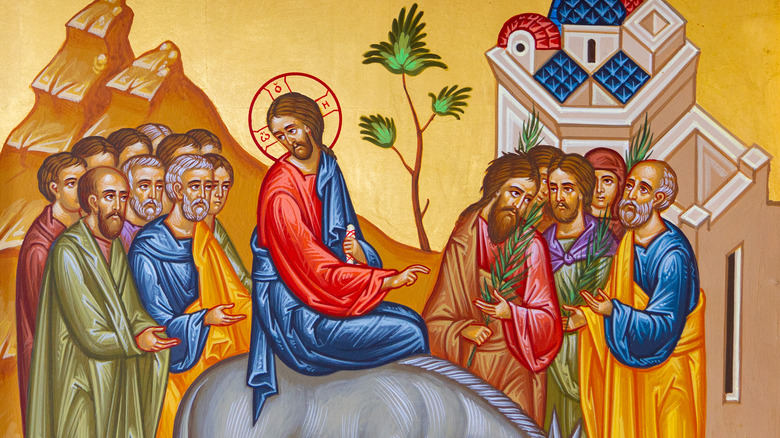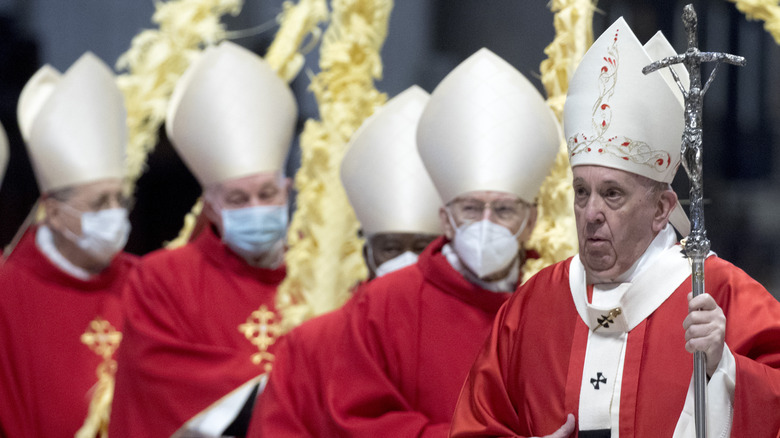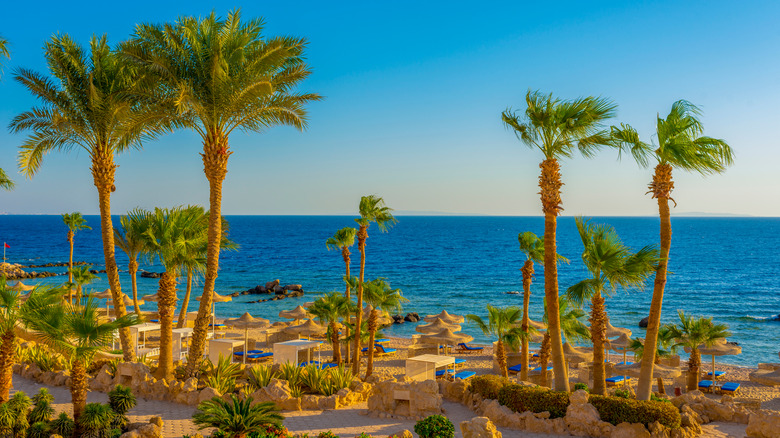What Is Palm Sunday And How Is It Celebrated?
Christians around the world, regardless of sect or theological leanings, can all agree on one tenet of faith: that the resurrection of Jesus is the most important part of their religion. Without it, Jesus was just a dude. A nice dude, perhaps even a wizard or prophet, but not the instantiation of a deity.
This is why Lent, the 40-day season of ritual observation from March to April — codified in 325 C.E. at the First Council of Nicaea (via Britannica) — is a key Christian season, particularly for Christianity's oldest doctrinal form, Catholicism. Lent starts on Ash Wednesday, the day after Shrove Tuesday (aka Fat Tuesday) — modernly known for spawning Mardis Gras in France and pancake races in the United Kingdom — and ends with Easter Sunday (via the BBC). And in the middle, marking Jesus' entry into Jerusalem on the back of a donkey (possibly a mule) the week before Easter lays Palm Sunday.
The Biblical New Testament books of Matthew, Mark, Luke, and John all contain versions of the tale. John 12:13, for instance, states (per Bible Gateway), "The next day the great crowd that had come for the festival heard that Jesus was on his way to Jerusalem. They took palm branches and went out to meet him, shouting, 'Hosanna!'". Jews of the time took Jesus' arrival as the fulfillment of prophecy laid out in the Old Testament book of Zechariah, which says (via Bible Gateway), "See, your king comes to you, righteous and victorious, lowly and riding on a donkey, on a colt, the foal of a donkey."
The beginning of the Christian Holy Week
Palm Sunday might not be as well-known as bigger, marquee Christian holidays like Christmas and Easter, but it's nonetheless a critical day on the annual, religious calendar. It marks the beginning of what Catholics and certain Protestants (e.g., Lutherans, Methodists, via Learn Religions) call "Holy Week," which ends on Easter Sunday, the day when Christians believe that Jesus returned back to life.
Holy Week contains all those very recognizable, high-profile vignettes leading up to, and including, Jesus' death and resurrection: the Last Supper, Jesus praying in the Garden of Gethsemane, Jesus' betrayal by Judas, Jesus' arrest and torture (the Passion), Jesus carrying his cross up to Golgotha, Jesus vanishing from his tomb, etc. Per Almanac, the last day of Holy Week is Easter, which falls on the first Sunday after the first full moon following the spring equinox in the northern hemisphere (which is why probably nobody can ever remember the date). Holy Week itself comes at the end of Lent, which starts 40 days prior to Easter.
Even though Holy Week contains some pretty physically gruesome events (crown of thorns on the head, nails in the wrist, whips to the back, spear to the side), the whole thing is considered not only sacred but ultimately celebratory. After all, as Christians believe, without it, humanity would be damned forever. For all intents and purposes, Palm Sunday is a happier event than not, same as it was to Jewish messianic believers circa 30 C.E.
Prayer, self-reflection, and the occasional palm frond
Like any other facet of Christianity, the celebration of Palm Sunday depends on the denomination. Seeing as Palm Sunday happens during Lent, a season of self-denial and spiritual reflection, the more austere, time-honored method of celebration begins with a modest, contrite reiteration of basic tenets of faith. Not to retread tired tropes of "Catholic guilt," but as the BBC says, clergy often encourage church-goers to think about their own wrongdoings and hypocrisy. Leading up to a day when Christians consider Jesus to have sacrificed his life in place of one's own — Good Friday — such figurative self-flagellation is meant as a humble act.
Some congregations actually tote physical palm fronds into church (maybe plastic versions) in imitation of what the ancient Jews did to welcome Jesus into Jerusalem. Matthew 21:8 says (via Bible Gateway), "A very large crowd spread their cloaks on the road, while others cut branches from the trees and spread them on the road." The "branches" in this case, identified as palm branches in other books, are a millennia-old symbol of "victory, triumph, peace and eternal life" not only to Jews but in the Middle East in general (via Manchester Ink Link). Leviticus 23:40 in the Old Testament instructs the ancient Hebrews regarding a celebration (via Bible Gateway), "On the first day you are to take branches from luxuriant trees — from palms, willows, and other leafy trees — and rejoice before the Lord your God for seven days."
A universal symbol of sustenance and prosperity
So what's the significance of palm trees, anyway? To the ancient Jews, the Middle East in general, and also Asia Minor, the Mediterranean, northern Africa, and more, they're a deeply embedded cultural signifier. They're a type of symbolic shorthand in the way that a crown represents royalty, dignity, and power. And in an arid, desert region, it's not too hard to see how the relevance of palm trees to daily life long ago translated into symbolic, poetic value.
As the Journal of Association of Arab Universities for Tourism and Hospitality explains, palm trees played an integral role in ancient Egyptian life. They were used as shade from the sun, for a source of water, their fruit (dates) were eaten for sustenance, and they were associated with numerous gods, customs, and funerary rites. They played a similar role to the ancient Greeks, were given in frond form as a reward to athletes in competitions, and appear on artwork connected to victorious battle scenes. As My Myth Stories states, in Islamic culture, palm trees represent rest and hospitality, like an oasis in the desert. In 1675, the poet W.H. Baron von Hoberg summarized the relevance of palm trees by writing, "Palm tree produces nothing useless: and fruit, and juice, oil, bark, leaves."
All in all, nobody living in Jesus' time would have missed the significance of laying palm leaves on the ground as a royal carpet, so to speak, to mark Jesus' entrance into Jerusalem.
Alternative expressions of faith
Not all Christian sects celebrate Palm Sunday. Mormons — we're not going to engage with the whole "Mormons aren't real Christians debate" — eschew the celebration of Palm Sunday the same way they do many other religious observances throughout the year. The reason being, as FAIR explains, they prefer to keep the focus on regular interaction with the divine — such as on Sundays or through the sacraments — rather than placing emphasis on specific holy days.
Other Christians, on an individual basis, simply don't think there's anything textual (in the Bible) requiring the celebration of Palm Sunday. Such arguments often go hand-in-hand with discussions regarding the pagan origins of what are now ostensibly Christian holidays, even observances like Christmas (the Roman festival of Saturnalia, via History) and Easter (Eostre and much more, via The Guardian). But truth be told, at this point in history, sifting through the accretions of time and culture to find something "pure" and without influence will likely leave a person with no options whatsoever.
Yet other Christians, specifically of the evangelical bend, hold straight-up concerts on Palm Sunday, as clips on YouTube depict. Although to be honest, such folks might hold concerts on any random Sunday, anyway. The Christian website Life Church describes how "irrational" it is for folks to cheer "hosanna" and place palm branches on the ground for a guy on a donkey (or mule) to walk over and then proceed to extol the virtues of such actions as evidence of belief.
Traditions spanning continents, millennia, and cultures
Palm trees crop up regularly in the Bible, beyond Jesus' entrance into Jerusalem described in the Gospels or instructions to the Hebrews in the Old Testament. Psalms 92:12-14 analogizes a faithful person to a palm tree, saying (via Bible Gateway), "The righteous will flourish like a palm tree, they will grow like a cedar of Lebanon; planted in the house of the Lord, they will flourish in the courts of our God. They will still bear fruit in old age, they will stay fresh and green." The apocalyptic visions of the Book of Revelations refer to palm trees as well, stating (via Bible Gateway), "After this I looked, and there before me was a great multitude that no one could count, from every nation, tribe, people and language, standing before the throne and before the Lamb. They were wearing white robes and were holding palm branches in their hands."
As stated, Palm Sunday lands a week before Easter. In 2022, that means April 10. Christians might spend part of the day brushing up on the full story of Jesus' entrance to Jerusalem as laid out in the four Gospels. Matthew 21:1-7 says that when Jesus was about to head into Jerusalem, he instructed his disciples to go ahead and fetch a donkey tied up in a village (via Bible Gateway). But no matter how folks celebrate, they'll be taking part in customs spanning millennia, continents, and numerous cultures and religions.





